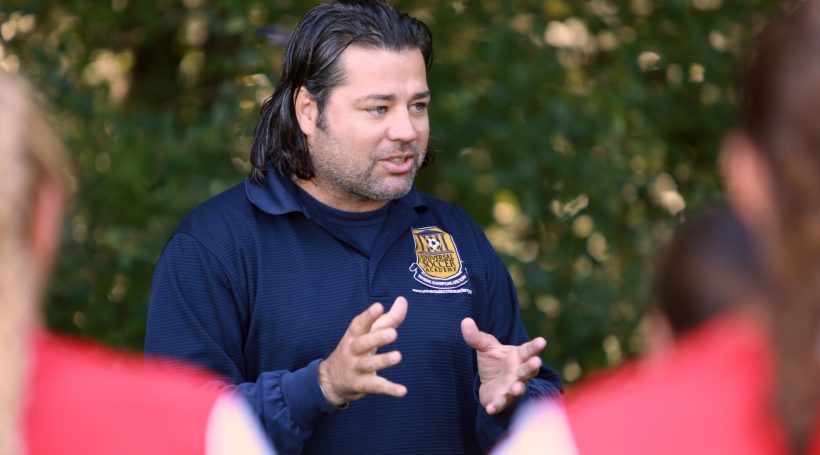Not many people can say they helped make an Olympic athlete, but James Galanis can – multiple times. As director of soccer operations for Universal Soccer Academy in Medford, Galanis coached Carli Lloyd, Heather Mitts and Hope Solo when they were kids. All three grew up to win Olympic gold as members of the U.S. women’s soccer team. Who better then to offer advice to parents raising young athletes? Odds are your child won’t make the Olympics, but this successful coach will tell you they can still win at sports.
Very few kids actually make it professionally. How should parents manage their expectations?
I’ve had the opportunity to work with thousands of kids over the years, and I’ve been lucky enough to have produced three professional athletes. Those kids didn’t make it because of me. It wasn’t the school, the club or the coach. These kids had an obsession. They lived and breathed the game, and that’s why they went on to become professionals. You can’t build a professional soccer player. No coach can inject will into a kid. If your kid is not with a ball every spare minute of the day, he’s not going to be a professional. If you think your kid is going to become a professional by you buying a trainer, getting him into a good facility or buying him good equipment, you’re dreaming. Professionals are built when no one is watching.
Why is it beneficial for kids to play sports?
The most important thing about sports is the life lessons you can extract from them. That’s what a good parent looks for. For example, when there’s a dispute between your child and a teammate, the parent should encourage the child to work it out, because a team needs to act as one. That lesson will carry over when your kid is older, and there’s division in the workplace. Similarly, when a child is always late to practices and games, they will ultimately be late to a job. It’s the life lessons we should be extracting after every game and training session, not talking about why a person missed a goal or that the coach made bad substitutions.
When should children start playing a team sport?
Five years old is the normal age to start. At that age they have more focus and have grown more. The chances of them liking it and having success are higher. Younger than that it’s hard for them to focus, and their body mechanics aren’t as progressed.
How many different athletic activities should kids try?
When your child is around 5 years old, get them to try a few sports and see which ones suit their mind, body and character. See where their love falls. They can try two sports at a time, but no more than that. It’s hard for a young kid’s mind to concentrate four or five times a week and be successful. They can’t be competitors every time they go out on the field. If you’re taking them from basketball to baseball to football to soccer, it’s not possible for them to fully concentrate, give 100-percent effort and perform at their peak every day of the week at every sport they’re trying. They need to play, and they need time away from the game. Put them in two sports in the spring, then in the fall let them try something else, then in the winter something else. Look back at the end of a year or two, and see what your child seems to love the most. Put that at the top of the list.
At what age should young athletes begin to specialize in one sport, and should that be year-round?
When they are about 12 years old they can start specializing. The people at the top are year-round athletes, and if you want to be able to compete with them later in life, you have to be year-round as well. That doesn’t mean you can’t play other sports, but pick one you want to be the best at, and the rest are just for fun.
Is there any risk physically or emotionally to playing a sport year-round?
You need to take time off – you can’t go 12 months of the year. I would say 10 months out of the year would be a full-time athlete. Then they don’t get burned out. I force my students to have June and December off to let their bodies heal and let their minds take time away competing. All of a sudden they miss the sport and can’t wait to come back. If you keep them 12 months out of the year, they are going to be burned out and not motivated to come to the field. They’ll have sloppy days when they’re not concentrating. If they’re not concentrating, that increases the chances of physical injuries.
How can a parent best motivate a child?
It’s not a case of motivating them but of making sure they’re having fun. Every time they walk off the field, the parent should be giving positive feedback and not worrying if they didn’t score a goal or have a good game. Make the kid feel that they are doing great and having success. Then they will be motivated on their own to go back, because they like feeling they are progressing and making mom and dad happy.
What is the biggest mistake parents make?
For younger kids, often you see a child not focusing because he’s 5 years old, and mom and dad get him in the car and say, “You need to focus and work harder when you’re out there.” They are giving the kid advice to act like an adult and perform like an adult, when the child really can’t. It’s about finding all the good things that your kid does.
The other big mistake parents make is judging your child and the team by winning. Until they are 15, all you should be worried about is whether they are improving every day and learning the game every time they play. Is their body becoming stronger? Are they mentally improving in the focus and confidence departments? That’s the main thing parents should be evaluating. Beyond 15, once they’ve gotten all the tools and improved in all those areas, then you can start putting an emphasis on winning.
What should a parent do when a child loves a sport but doesn’t make the team?
There’s a team for everybody. Every parent wants their kid to play on the best team, but if your child is sitting on the bench and not really playing, you are psychologically damaging your child. If your kid doesn’t make the A team or a high-level team, it’s okay. When you find another team, make sure your child is valued, is playing, is a go-to person that the team is relying on, and feels special to be a part of that team. It’s very important to find a team that suits your child and where the child is stimulated.
What should parents know about concussions?
Every parent should do their own independent baseline test on their child before getting their kids into an activity. They’ve got to understand that concussions are a very serious issue, and they shouldn’t take any risks at all when there is some type of head injury. A concussion is basically a bruised brain. If you cause long-term damage to your brain, you’ve got some serious issues that could be devastating for the rest of the kid’s life. You can’t take that lightly.
WEB BONUS
Should a parent step in if a child is having a problem on the team, like sitting on the bench too much?
The ideal situation is to let your kid fight his own battles. If the kid is not getting playing time, the parent can’t go complaining to the coach. The parent needs to teach the kid to go out there and prove the coach wrong by being the hardest working kid at training and by going in the backyard to improve his skills, so he can force his way onto the team. Now the kid is learning how to persevere and solve a problem.
How does a parent encourage a child who is talented in a sport but not interested in pursuing it?
The child shouldn’t play if his heart isn’t into it. It’s the child’s life. As parents, we need to guide them through the obstacles and the path they want to go through. We can’t force them down a path if that’s not what they want, because when they go there, they’re not going to put in the effort. They are probably going to be disrespectful. They will probably show bad body language and not concentrate. That’s going to force their teammates to not like them, anger the coach and embarrass the child.
With so many options, how do you choose the right sport?
They need to love it. If you don’t put them in an environment where it’s fun for them, they can get put-off. When it’s fun, they love it, and when they love it, they play, and when they play, they get better. They want to feel they are improving and progressing. If everyone else around them is achieving and your kid isn’t, that will turn the kid away. They won’t want to go the next time.














